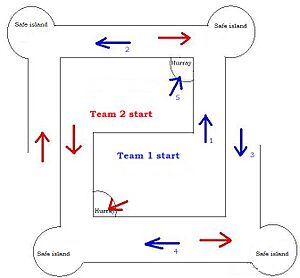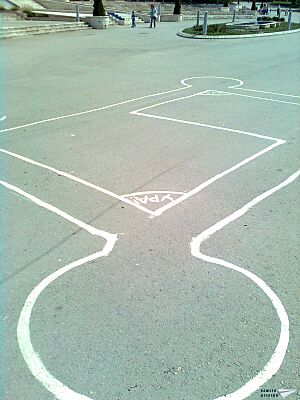Hurray (game) facts for kids
Hurray (sometimes called Boom) is a fun children's game from Bulgaria. It became popular in the late 1970s and 1980s. Kids usually play Hurray outside on flat, hard surfaces like streets or car parks. The game needs a special drawing on the ground, often made with chalk.
Contents
How to Play Hurray
Hurray is a game played by two teams. Each team needs the same number of players. The game takes place on a special drawing on the ground. This drawing has two main areas called "fields" and connecting paths called "corridors."
The Game Area
The game area is drawn on the ground. It has two main fields for the teams. There are also narrow paths called corridors. These corridors connect the two fields. In one corner of each field, there is a small triangle. There are also special circles called "corners."
Basic Rules
The main goal for each team is to reach the other team's triangle. To do this, a player must leave their own field. They then move through the corridors. Next, they enter the other team's field. Finally, they must step on the triangle and shout "Hurray!"
Moving Around the Drawing
Players must stay inside the lines of the drawing. If a player steps on a line or outside the drawing, they are "burned." Being "burned" means you are out of the game.
What Happens If You're "Burned"
If you are "burned," you cannot play anymore in that round. Players from the other team try to make you step out. They can gently pull or push you. This makes it harder to stay inside the lines.
Safe Spots in the Game
There are special safe spots called "corners." When a player is inside a corner circle, they are safe. Opposing players cannot pull or push them while they are in a corner. Also, players who are outside the main drawing cannot push others into a corner.
 | Calvin Brent |
 | Walter T. Bailey |
 | Martha Cassell Thompson |
 | Alberta Jeannette Cassell |



